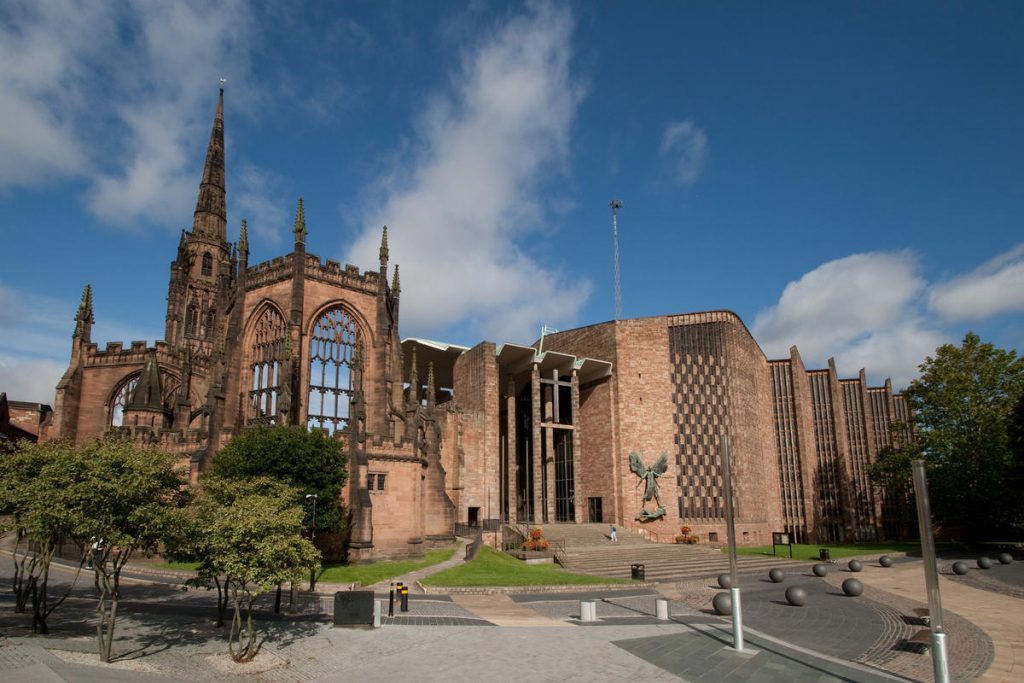https://www.youtube.com/watch?v=HwBEtfXXsvU
On Memorial Day, 1982, Pope John Paul II proclaimed, as Britain and Argentina came to blows over the Falkland Islands:
War should belong to the tragic past, to history: it should find no place on humanity’s agenda for the future.
Pope John Paul II, Homily at Coventry, England
https://www-jstor-org.ezp.lib.rochester.edu/stable/23546289
These words were spoken in Coventry, England–the same sight for the premiere, 20 years earlier on Memorial Day, 1962, of Britten’s War Requiem at the consecration of the reconstructed St. Michael’s Cathedral, which had been bombed out along with the rest of Coventry in 1940.
The Conception: Britten the Pacifist
For many, the destruction of Coventry, a non-military target, was symbolic of German brutality during the war. As such, it’s reconstruction from ruin was, despite limited post-war resources, a much-needed healing of old wounds and a statement of Britain’s recovery and resilience (Wiebe 194).

Date: January 2011 Photographer: Coventry Cathedral/World Monuments Fund
https://www.wmf.org/project/ruins-former-cathedral-church-st-michael-coventry
When the new Cathedral was finally rebuilt … it was both a monument to the losses of the Second World War and a powerful statement of renewal, a statement given new urgency by rising Cold War tensions.
Heather Wiebe, Britten’s Unquiet Pasts, p. 194
Britten was tapped to write a piece to commemorate the newly rebuilt St. Michael’s Cathedral at the 1962 Coventry Festival ostensibly because of his major international presence and success as a distinctly British composer. This was despite Britten being a well-known pacifist who went abroad just prior to the second world war breaking out and later registered as a conscientious objector, an important point of contention at the time.
Acting on his beliefs, Britten chose to interweave the traditional Latin requiem texts with the poetry of Wilfred Owen, an anti-war poet who died in military service during the First World War. Erin MacLean, of the University of Regina, postulates that Britten’s choice to use the words of a young soldier-poet provided crucial sentiments informed by real war experience that Britten himself lacked (MacLean 44).
The Execution: Vishnevskaya’s Absence
And yet, its premiere was not to go without a hitch. Britten, in order to bolster the anti-war symbolism of the event, intended for the three soloists to be British tenor Peter Pears, German baritone Dietrich Fischer-Dieskau and Soviet soprano Galina Vishnevskaya. It was to signal a union of Europe from the ashes–a new spring.
Britten himself kept close ties with the Soviet Union following the war, visiting often and befriending and working with many Soviet composers and soloists, including Shostakovich, Rostropovich and Vischnevskaya. He drew on these connections to bring Vishnevskaya out of the country to Coventry for his premiere, but mere weeks before the piece was to be performed, the Soviet Union blocked Galina Vischnevskaya from leaving the Soviet Union, likely because of the involvement of Fischer-Dieskau with the project. After all, she was allowed to record the piece and perform it only a year later at the Aldeburgh Festival in Suffolk.
The British Ambassador rightly concluded that the Soviet decision not to allow Galina Vishnevskaya to sing at the premiere of the War Requiem in 1962 … was due to “the character of the occasion at Coventry and possibly to the joint participation of Fischer-Dieskau rather than the work itself/
Cameron Pyke, Benjamin Britten and Russia, p. 171
Music could not be freed from political interests, even to pray for peace. Ultimately, Irish soprano Heather Harper stepped in and performed at the premiere with only ten days notice.
Zooming Out
Fifty-five years after the Coventry Festival of 1962, conservative radio personality Dennis Prager sparked remarkable controversy when he was invited to conduct Haydn’s Symphony No. 51 with the Santa Monica Symphony in Los Angeles, as was highlighted in a September 2017 article in Musicology Now by University of Chicago PhD candidate Ted Gordon.
For Prager, “classical music” is a core component of Western culture, which he claims is under attack by secularism, multiculturalism, the Muslim faith, same-sex marriage, academia in general, and the “war on Christmas.”
Ted Gordon, “Does ‘Music Trump Politics’? Dennis Prager and the Santa Monica Symphony Orchestra
http://musicologynow.ams-net.org/2017/09/does-music-trump-politics-dennis-prager.html
Guido Lamell, music director of the Santa Monica Symphony, defended his invitation to Prager, which triggered protests from those who disagreed with Prager’s cultural and political views, by stating “music trumps politics.” Similarly, Prager responded to the backlash by stating that this particular performance–of an innocuous Haydn symphony–was in essence apolitical. But as Gordon wrote:
Yet Prager’s performance with the SMSO is of course political: it uses the “genius” of classical music as evidence towards his political ideology of “Western” supremacism. In addition, more practically speaking, his presence at this concert worked towards the creation of a new political group: people united by their supposedly “apolitical” support of “Western Art Music”.
Ted Gordon, “Does ‘Music Trump Politics’? Dennis Prager and the Santa Monica Symphony Orchestra”
Britten’s War Requiem shines as an example of just how intertwined politics and music often, inevitably, are. One can look back at 1962 and see the politics at play, the powers and views embedded in the very essence of the project’s conception and execution. Music does not trump politics so much as it reacts to politics–either by willful ignorance, support or subversion. Britten’s was more the latter two, and while Haydn’s symphonies may ostensibly exist independent of today’s politics, the context in which they are presented today can invite politics’ influence in profound ways.
Sounds of a Better World: Music in Protest of War
Despite Pope John Paul II’s plea in 1982, war has not left humanity’s agenda. It is in the news, on our Twitter feeds and on our breath: Vietnam, Iraq, Afghanistan, Syria. The list of violent conflicts, new and old, is extensive, and ever-growing. And yet, so is the body of music produced in response to and in protest of war.
Britten was not the first composer to ever sing in the face of violence, and he is certainly not the last. In 2015, children’s choral composer Jim Papoulis set a poem written by Virginia 7th grader Claire Latimer entitled I Ask For One Day for the Fairfax Choral Society Poetry of Music collaboration with Fairfax County Public Schools.
I ask for one day
Where I don’t have to hear about pain or life that’s lost.
Claire Lattimer, “I Ask For One Day”
https://www.jwpepper.com/I-Ask-For-One-Day/10881214.item#/submit
Papoulis, in his composer’s notes, wrote:
The sentiment of a 12-year-old child making a plea for peace and non-judgement, for just one day, is about as pure and as real of a feeling as I can imagine.
Jim Papoulis, “I Ask For One Day” Notes from the Composer
https://www.jwpepper.com/I-Ask-For-One-Day/10881214.item#/submit
The piece was published under Boosey & Hawkes’ Sounds of a Better World. Of course, a 7th grade student from Virginia doesn’t have quite the same experience as a poet who died in the trenches of World War I, and it may be a while before we align Jim Papoulis with the likes of Britten. In fact, Benjamin Britten and Wilfred Owen seem as far removed from Jim Papoulis and Claire Lattimer as just about anything, but I believe one can draw a powerful comparison in good faith under that fitting phrase: sounds of a better world. Those who would separate music from politics would invalidate the possibility of such sounds.
Works Cited
Gordon, Ted. “Does ‘Music Trump Politics’? Dennis Prager and the Santa Monica Symphony Orchestra.” Musicology Now, 19 September 2017,
http://musicologynow.ams-net.org/2017/09/does-music-trump-politics-dennis-prager.html. Accessed 1 April 2019.
MacLean, Erin. “I am the enemy you killed, my friend”: Sacrifice, Pacifism and Reconciliation in Benjamin Britten’s War Requiem. MA Thesis. University of Regina, 2011. Web. 1 April 2019.
https://search-proquest-com.ezp.lib.rochester.edu/docview/1045938046?accountid=13567.
Matonti, Charles J. “A Prayer for Peace Now: Britten’s War Requiem Revisited.” The Choral Journal, vol. 24, no. 2, 1983, pp. 21–30. JSTOR,https://www-jstor-org.ezp.lib.rochester.edu/stable/23546289.
Papoulis, Jim. I Ask For One Day. 2015. New York: Boosey & Hawkes, 2015. Print.
Pyke, Cameron. Benjamin Britten and Russia. Woodbridge: The Boydell Press, 2016. Print.
Wiebe, Heather. Britten’s Unquiet Pasts. Cambridge: Cambridge University Press, 2012. Print.


Hi Andrew, this was an interesting read. I enjoyed the various examples you used to support the idea of music and politics. It is a hard question to answer since politics can be a touchy subject to many. You have various quotes, sound examples, and explanations about these topics which is nice to read about considering I do not know much about this topic. Some suggestions I would put would be trying to connect all these thoughts you have. I found it hard to read since there are so many interesting things you pointed out but you need a stronger way to connect all of them. I felt like they were all separate little points that could have been one strong argument. Also I was lost in the beginning because I do not know anything about Britten or what context you put this in. Was this World War I, World War II, or some other conflict? It seemed like you just jumped straight into the topic without any preface. Other than that, I liked this topic.